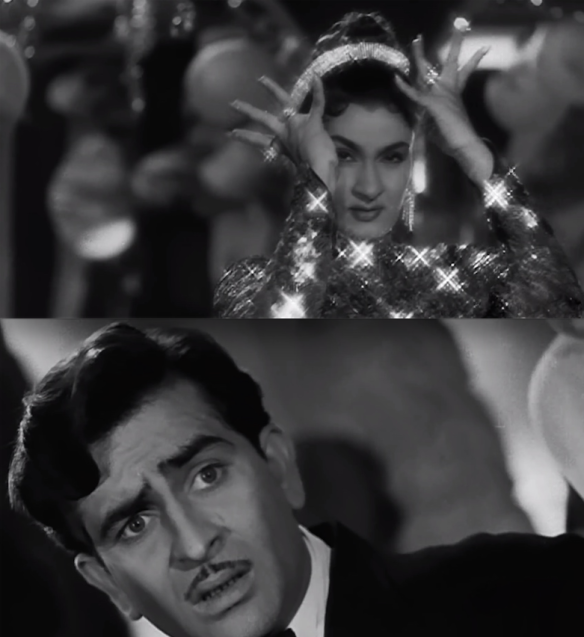
In a classic example of a dutch angle, Raj Kapoor recoils from the snake-like Nadira in Shree 420 (1955).
Today we present the lyrics and English translation of the famous “Ramaiya Vastavaiya” from Raj Kapoor’s 1955 blockbuster Shree 420. One of the most priceless gems of India’s Golden Age of Cinema, Shree 420 is a showman’s dream. In an era when the aesthetic of film was still an experimental playground, Raj Kapoor’s Shree 420 is as original and evocative as it was 60 years ago.
Raju, played by Raj Kapoor himself, arrives in Bombay as a patriotic simpleton crooning “Mera Joota Hai Japani.” In a pawnshop, Raju encounters Vidya (played by Nargis, in her final romantic appearance opposite Raj Kapoor under his banner production company), a pretty teacher who is selling her bangles to help pay for her struggling school (and whose name redundantly means “knowledge.”) For the next few weeks, Raju works hard to both earn a decent living at a laundry service and to woo the principled Vidya, dreaming of a simple and happy future family.
However, this utopian simplicity does not last long. When Raju delivers some pressed shirts to a wealthy flat, he meets Maya (whose name significantly means “illusion”), a high society woman who thrives on parties and gambling with the rich. She recognizes Raju’s untapped potential as a cunning cardshark, and lures him to a fancy soiree where she introduces him as Rajkumar, the Prince of Pipalinagar, of all things ridiculous. This brief taste of luxury and easy money leads Raju to agree to form a partnership with the corrupt industrialist Seth Dharamanand, bringing him instant wealth.
But Raju’s whirlwind romance with high Bombay society is stained by the shame Vidhya instills in him for his actions, and one night at the nightclub, he sees Maya and her world of illusion for what they truly are. He runs away in horror back to the slums that once gave him a home. Enter the song “Ramaiya Vastavaiya,” a cute villager number complete with chorus girls in native dress and a heavy-handed reminder that yes, poor people can be happy too.
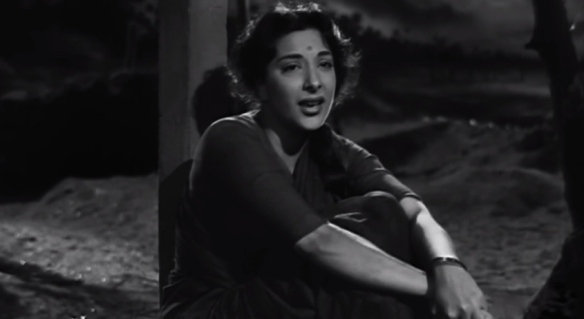
Nargis plays a virtuous, impoverished schoolteacher who struggles to give her students a better life in Shree 420 (1955).
Of course, the question you really want answered is, what the heck does “Ramaiya vastavaiya” mean?
It turns out Ramaiya vastavaiya is Telegu for respectfully asking, “Ram, won’t you come?” Legend has it that music composer Shankar Singh Raghuvanshi, who grew up in Hyderabad where Telugu is a dominant language, had been demonstrating his composition to director Raj Kapoor using placeholder Telugu lyrics. When Raj Kapoor heard the tune, he loved it so much, he wanted the Telugu title lyrics to be included in the final version! And perhaps the convenient symbolism did not escape Raj Kapoor–like Lord Ram returning at last to his kingdom, Raju finally comes back to the people who love him and his true home.
But all that aside, the real reason everyone has adored “Ramaiya Vastavaiya” for generations is simply that it’s so darn catchy. If you hear it once, you’ll be humming it all day! We hope you enjoy our English translation to the lyrics of this all-time favorite below. Follow along with the video and let us know in the comments how much your mind was blown like ours by the discovery of Ramaiya vastavaiya‘s Telugu roots.
Ramaiya Vastavaiya Lyrics and English Translation:
Mohammed Rafi:
Ramayyaa vastaavayyaa, ramayyaa vastaavayyaa
Ram, will you return?
Lata Mangeshkar:
Mai.N ne dil tujhko diyaa
I have given you my heart
Chorus:
Haa.N ramayyaa vastaavayyaa, ramayyaa vastaavayyaa
Yes, Ram, will you return?
Mai.N ne dil tujhko diyaa
I have given you my heart
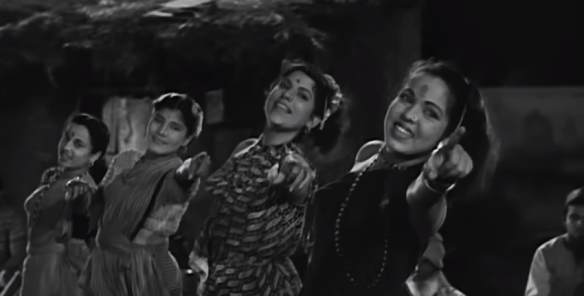
Dancer Sheela Vaz plays a stock village girl with all the right morals in Shree 420 (1955). While shooting the song, Sheila Vaz, who did not speak Hindi, studied a translation of “Ramaiya Vastavaiya” and faked it till she made it!
Mohammed Rafi:
Naino.N mei.N thii pyaar kii roshnii
In your eyes was the light of love
Teri aankho.N me yeh duniyaadaari na thii
This worldliness was not in your eyes then
Lata Mangeshkar:
Tu aur thaa teraa dil aur thaa
You were different, your heart was different
Tere man mei.N yeh miThi kaTaari na thii
This sweet dagger was not in your heart then
Mohammed Rafi:
Mai.n jo dukh paauu.N, to kyaa? Aaj pachhataauu.N, to kyaa?
If I become sad, so what? If I regret today, so what?
Chorus:
Maine dil tujhko diyaa
I have given you my heart
Oh ramayyaa vastaavayyaa, ramayyaa vastaavayyaa
Oh, Ram, will you return?
Mohammed Rafi:
Us desh mei.N tere pardes mei.N
In that country, in your foreign land
Sone chaa.Ndi ke badle mei.N bhikate hai.N dil
Instead of gold and silver, they sell hearts
Lata Mangeshkar:
Is gaao.N mei.N, dard ki chhaao.N mei.N
In this village, in the shadow of pain
Pyaar ke naam par hii dhaDakte hai.N dil
Hearts beat only in the name of love
Chaand taaro.N ke tale, raat yeh gaatii chale
In the tent of the moon and stars, the night sings this songs
Maine dil tujhko diyaa
I have given you my heart
Chorus:
Oh ramayyaa vastaavayyaa, ramayyaa vastaavayyaa
Oh, Ram, will you return?
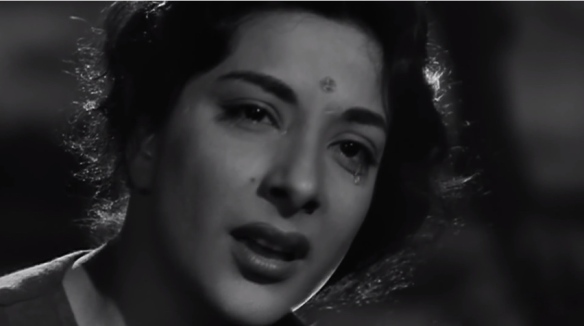
Joining in on the song playing on everyone’s lips in town, Nargis mourns for her lost love in Shree 420 (1955).
Lata Mangeshkar:
Yaad aati rahii dil dukhaati rahii
I still remember you, my hearts still grieves
Apne man ko manaanaa na aayaa hame.N
But I do not know how to conciliate my own mind
Tu na aaye to kyaa? Bhuul jaaye, to kyaa?
If you do not come, so what? If you forget, so what?
Pyaar karke bhulaanaa na aayaa hame.N
But having fallen in love, I do not know how to make myself forget
Wohii se duur se hii, tu bhi yeh keh de kabhii
Even from far away, say this sometime
Maine dil tujhko diyaa
I have given you my heart
Chorus:
Oh ramayyaa vastaavayyaa, ramayyaa vastaavayyaa
Oh, Ram, will you return?
Mukesh:
Maine dil tujhko diyaa
I have given you my heart
Chorus:
Oh ramayyaa vastaavayyaa, ramayyaa vastaavayyaa
Oh, Ram, will you return?
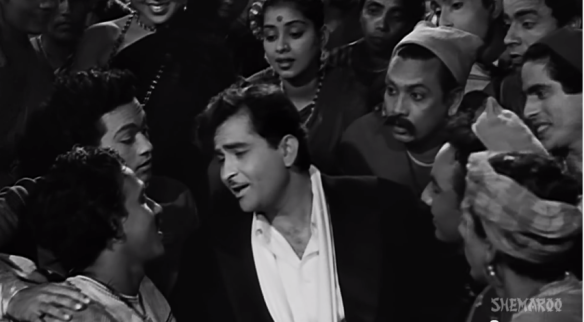
Embodying the return of Lord Ram, Raj Kapoor leaves the glitzy world of Bombay nightlife to engage a captive audience of villagers in Shree 420 (1955).
Mukesh:
Rastaa wohii aur musaafir wohii
The path is the same and the traveler is the same
Ek taaraa na jaane kahaa.N chhup gayaa
But I do not know where that star has hidden itself
Duniyaa wohii duniyaawaale wohii
The society is the same, the citizens are the same
Koi kyaa jaane kiskaa jahaa.N luT gayaa
No one knows whose world has been destroyed
Merii aankho mei.N rahe, kaun jo mujh se kahe?
Who once told me to remain forever in their eyes?
Maine dil tujhko diyaa
I have given you my heart
Chorus:
Oh ramayyaa vastaavayyaa, ramayyaa vastaavayyaa
Oh, Ram, will you return?
Glossary:
Ramya vastavaiyaa: Ram, will you come (Telugu); dil: heart; nain: eyes; pyaar: love; roshnii: light; aankhe.N: eyes; duniyaadaari: wordliness; man: mind; heart; miiThaa: sweet; kaTaarii: small dagger; dukh: sadness; pacchtaanaa: to regret; desh: country (India); pardes: foreign country; sonaa: gold; chaa.Ndii: silver; [kisi ke] badle mei.N: in place of [something]; bhiktaanaa: to sell; gaao.N: village; dard: pain; chaao.N: shadow; naam: name: dhaDaknaa: [the heart] to beat; chaa.Nd: moon; taaraa: star; raat: night; gaanaa: to sing; yaad aanaa: to remember; dukhaanaa: to grieve; manaanaa: to conciliate, to cajole; bhuul jaanaa: to forget; bhuulaanaa: to make [someone] forget; duur: far away; kabhii: sometime; rastaa: path; musaafir: traveler; chhup jaanaa: to hide; duniyaa: society, the world; duniyaawaale: citizens; jahaa.N: world; luT gayaa: destroyed

With motherly affection, Lalita Pawar welcomes Raj Kapoor back to the fold with open arms in Shree 420 (1955).
The moral dilemma that plagues Raju’s existence eventually comes to a climax when Seth Dharamanand, Maya, and Raju are incriminated for swindling money from the poor to build communal houses. Seeking to atone for the past, Raju address the scores of poor people awaiting a home. Perhaps it is impossible to build houses for each person individually, he says, but they are a group of a million people, now united, and if they go to the government and demand land, they have the power to build their own homes with their combined money. The cure to poverty for the nation, he preaches, is not dishonesty, but hard-work and determination. Raju is released from his charges, and returns to the lifestyle of an honest workingman as he began, joined by Vidya who has forgiven him. The film finishes, humbled and hopeful, with the two heading down the road of life together.
Thank you to our fans Mustafa and Onima Thakur for this inspiring request!
-Mrs. 55
P.S. Be sure to watch the music video of this song and appreciate Raj Kapoor’s novel song transitions! Halfway through the song, the camera tracks “Ramaiya Vastavaiya” as it is picked up from the dancing villager’s circle by a passing horse carriage, overheard by a bicyclist, who carries the melody to Nargis sitting alone miles away, thereby fluidly retaining the realism of the sequence. Song transitions were still uncharted territory in this infant age of cinema–and Raj Kapoor, like the the great Guru Dutt, was a genius and pioneer. OK, OK I promise that’s the last thing I’m going to say about this song–but seriously, every scene in this movie is a film-lover’s gold mine!



